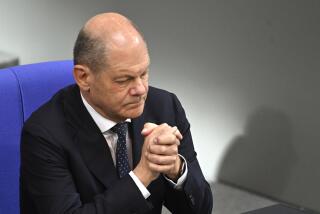Bonn Gets a Cold, U.S. Shivers : But Kohl Is Right to Give East Germany a Good Deal
- Share via
Chancellor Helmut Kohl, whose belated border reassurances to Poland only managed to further disquiet many Europeans, plans to offer East Germany generous economic terms to achieve political unification. And that’s a problem.
Kohl wants to make East and West German marks worth the same amount. Some financial experts estimate such a move would make the aggregate German money supply jump as much as 15% virtually overnight, a sure formula for inflation.
Those terms worry many in the West, who fear that domestic inflation would prompt the West German central bank to respond, as it almost invariably does to even a hint of inflation, by hiking interest rates. Washington frets that such a move would eventually wash up on U.S. shores and push up the interest rates here, where many already worry about a sluggish economy. A serious issue between Bonn and Washington has thus arisen.
Michael J. Boskin, the chairman of the Council of Economic Advisers, has urged Bonn to keep West German interest rates down. Boskin’s concern is understandable: With the intimate internationalization of the markets now a fact of economic life, when someone in Germany says Gesundheit , someone on Wall Street might assume a bad flu bug is going around and sneeze.
The truth is that no one is sure what the ripple effect would be, but even if the worst scenario came to pass, Washington must understand that Bonn does not have the luxury of making purely rational, unhurried economic decisions these days. In January alone 63,000 East Germans fled for West Germany and the migration has not appreciably eased. By year’s end, if the waves continue, perhaps 750,000 will have moved to West Germany. Already it is having a hard time absorbing all the newcomers and has an ugly anti-immigrant backlash on its hands.
Bonn has thus made the political calculation that unification on terms generous to the East Germans is perhaps the best medicine for what ails the two Germanys now. That undoubtedly is the correct--and perhaps the only--course of action open, short of rebuilding the Berlin Wall to keep the East Germans home. If the central bank perforce raises German interest rates after the union, some Western economies may, indeed, sneeze. But Western democracies will face far more serious problems if the German situation deteriorates and the movement toward democracy unravels. Bonn needs to proceed with its policy of unification in an atmosphere of maximum trust and understanding from Washington.
More to Read
Sign up for Essential California
The most important California stories and recommendations in your inbox every morning.
You may occasionally receive promotional content from the Los Angeles Times.













